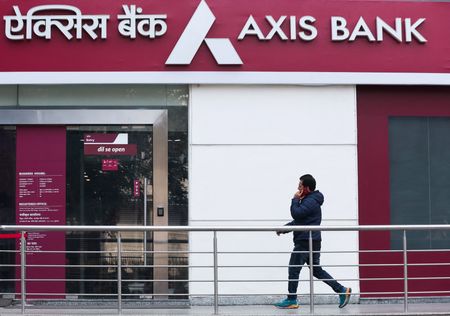(This July 24 story has been corrected to say that Axis is India’s third largest private bank, not fourth largest, in paragraph 1)
By Dimpal Gulwani and Siddhi Nayak
BENGALURU/MUMBAI (Reuters) – Axis Bank, India’s third-largest private bank by market capitalisation, reported a smaller-than-expected first-quarter profit on Wednesday as it set aside more funds for potential bad loans amid a deterioration in asset quality.
The Mumbai-based lender’s standalone net profit rose 4% year-on-year to 60.35 billion rupees ($721.2 million) for the quarter ended June 30.
Analysts had estimated a profit of 64.50 billion rupees, as per LSEG data.
Funds kept aside to cover potential bad loans and losses from any unforeseen events rose 97% from a year earlier to 20.39 billion rupees.
Axis Bank’s gross non-performing assets (NPA) ratio, a key gauge of lenders’ asset quality, deteriorated to 1.54% at the end of June from 1.43% in the previous quarter.
The seasonality in the retail agriculture business impacted NPAs during the quarter, said Puneet Sharma, chief financial officer, Axis Bank.
“In certain parts of the unsecured portfolio, we are seeing credit costs rise, but they remain well within our risk guardrail,” Sharma added.
The lender’s net loans grew 14% while total deposits rose 13% during the quarter.
Net interest income – the difference between interest earned and paid – rose about 13% to 134.48 billion rupees.
The net interest margin, a key gauge of profitability, shrunk to 4.05% from 4.10% a year ago, and 4.06% in the previous quarter.
Rivals Kotak Mahindra Bank and Yes Bank have also reported margin contractions for the June quarter.
Loan demand has been upbeat on healthy economic growth and strong urban consumption. Banks are raising deposits at a higher cost to fund the loan growth, which has weighed on margins.
Shares of Axis Bank closed 1.9% lower ahead of results. The stock has gained about 13% this year compared to a 12% rise in the benchmark Nifty 50 index.
($1 = 83.6810 Indian rupees)
(Reporting by Dimpal Gulwani in Bengaluru and Siddhi Nayak in Mumbai; Editing by Janane Venkatraman and Mrigank Dhaniwala)










